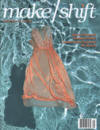make/shift – Spring/Summer 2013
Access. Activism. Marginality. (In)visibility. Social justice. Key concepts in LGBTQ circles, whether explicitly or subtly voiced in an Indonesian metropolis or an American prison, Palestine, or San Francisco. In the newest issue of Los Angeles-based make/shift, a vital magazine that “embraces the multiple and shifting identities of feminist communities,” filmmakers, documentarians, project organizers, and others reveal lives marking daily realities through visual and performing arts as well as through grassroots actions. This insightful, cogent selection offers several contemporary perspectives on urgent issues, including: violence and murder among transgendered populations; racial profiling playing a role in the arrest of a teenager; lingering consequences of abuse; and, in a featured interview with Victoria Law, author of Resistance Behind Bars: The Struggles of Incarcerated Women, the problems these women face, such as limited resources for childcare and shackling during childbirth.
Access. Activism. Marginality. (In)visibility. Social justice. Key concepts in LGBTQ circles, whether explicitly or subtly voiced in an Indonesian metropolis or an American prison, Palestine, or San Francisco. In the newest issue of Los Angeles-based make/shift, a vital magazine that “embraces the multiple and shifting identities of feminist communities,” filmmakers, documentarians, project organizers, and others reveal lives marking daily realities through visual and performing arts as well as through grassroots actions. This insightful, cogent selection offers several contemporary perspectives on urgent issues, including: violence and murder among transgendered populations; racial profiling playing a role in the arrest of a teenager; lingering consequences of abuse; and, in a featured interview with Victoria Law, author of Resistance Behind Bars: The Struggles of Incarcerated Women, the problems these women face, such as limited resources for childcare and shackling during childbirth.
Amid these moments, there’s no sense that harm must become a defining narrative. The writers consider successful outcomes—the teenager in question, for instance, was freed through sustained efforts and crowdsourcing for better legal representation—as well as possibilities for change, most innovatively in an article on local autonomy networks, by Micha Cárdenas, in which fashion and technology merge to create a warning system that may help prevent further violence in vulnerable communities, without relying on traditional authorities.
The Spring/Summer issue also includes art by Shizu Saldamando, a Japanese-Mexican-American artist who is interested in undermining the “tired notion of binary . . . this notion of good versus evil” by creating portraits of everyday individuals. Using gold leaf and unusual surfaces, including a handkerchief, and often set on neutral backgrounds, these paintings reveal both quiet intimacies and expressive gestures.
A series of posters by Tyrone Boucher, entitled “Queers Demand,” features simpler drawings with more overt political statements. Regularly recurring columns, a substantive reviews section, a crossword puzzle, two roundtable discussions on Girl Talk (a spoken word series) and Peacock Rebellion’s cabaret show that critiques nonprofits, as well as several other features round out the magazine. A particularly thought-provoking manifesto by Taylor Mac, an excerpt of “From Where I Stand”—in which succinct ideas on theater and craft become applicable to many arts—serves as the endnote.
With only one poem and one short story, it would be remiss not to mention them. “Love Letter to Industrial Agriculture from the Family Farm” by Chris Shorne is a satirical take on problems ranging from monoculture to increasing carbon footprints. Cascading down the page in pleading statements, it is a poem perhaps too dependent on message, ending with “Yes, I’m mad / (as a cow) about you: / eating myself / to feed you.”
Mia McKenzie’s “Longing” is a story on an impressionable child circling through images—a stand of beech trees, red nail polish—that remind her of her mother. Religion, domestic abuse, and memory overlap in understated ways, striking a balance between foreboding and love. Like many of the other works in the issue, there’s no shortage of hardship (this time, in the form of the mother’s suicide), but McKenzie doesn’t end on a brittle note, opting instead for resilience, brief tenderness, and a sense of increasing independence, if not forgiveness:
There was a tiny beech-tree leaf in my father’s hair, probably fallen from my mother’s favorite tree, and I took it out, delicately, so he did not notice. As we left the church, my father offered me his hand to hold. I did not take it. But I always knew that he was just a few yards behind me as I walked off ahead of him down Beechwood road, and on home.
make/shift is not glossy, nor overdesigned—produced in black-and-white with a columnar format, it emphasizes literary reportage, interviews, and other nonfiction, all of which resound with an invigorating cross-section of real, passionate voices. International in scope, while grounded in localities, this is a magazine of consequence.
[www.makeshiftmag.com]





